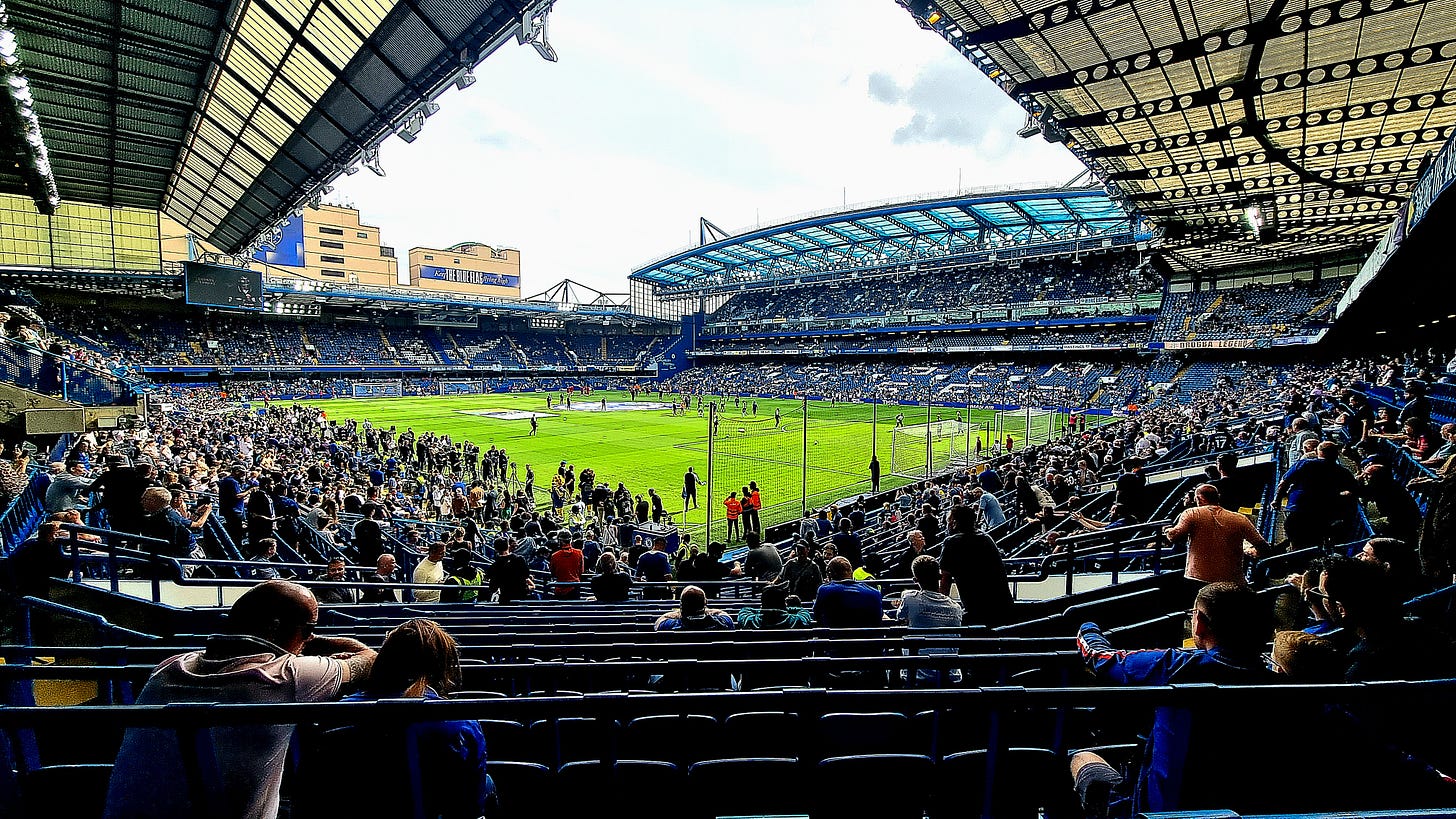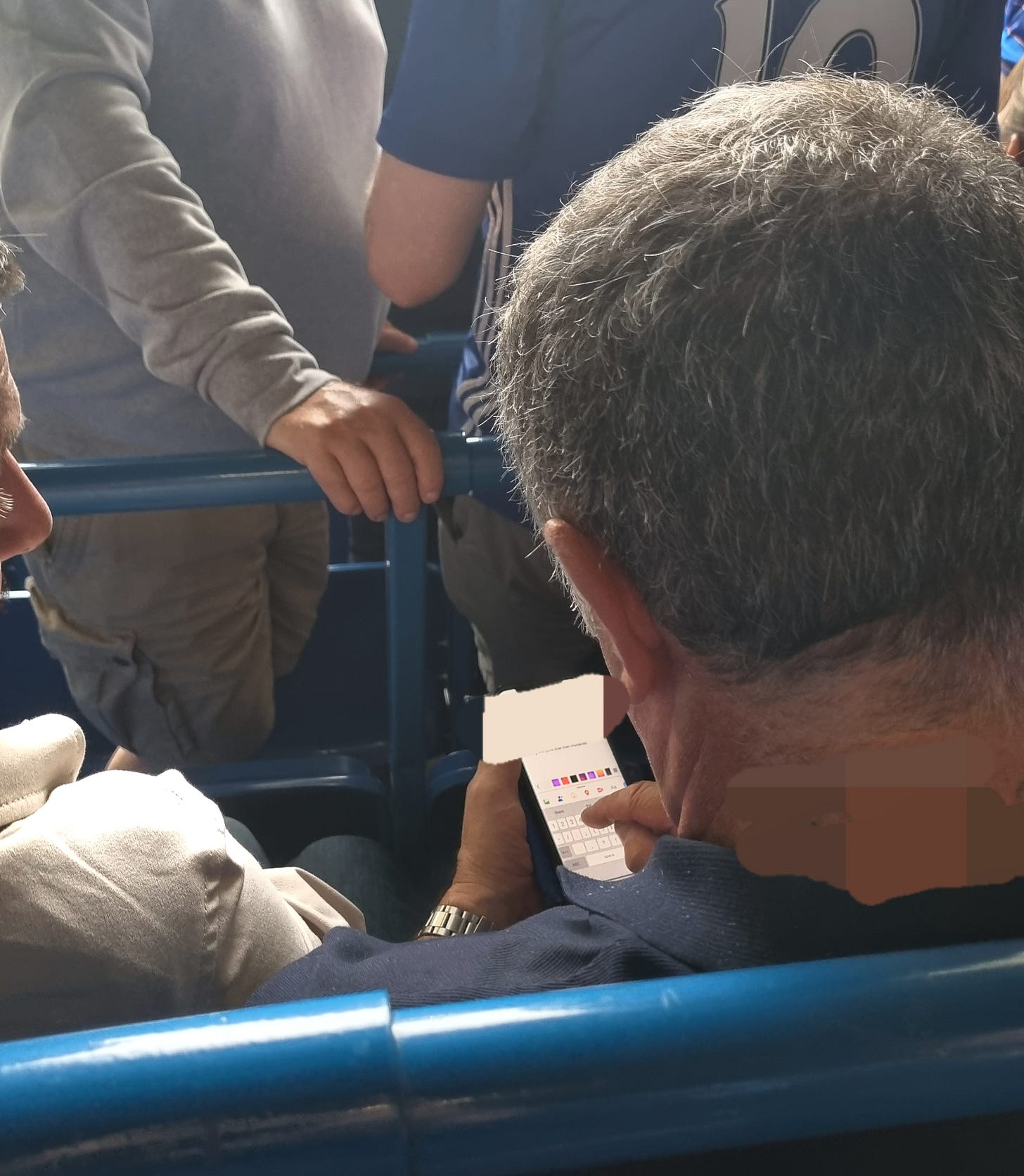Football Bigotry: Deep Behind Enemy Lines
It is still alive and well in England's top flight. Is anyone surprised?
“Come on, f****** sing! Who do you support?”
It was barely twenty minutes into the match, and my cover was at risk of being blown. I chanced a furtive look behind at my interrogator, and saw a young woman donning a Chelsea FC bucket hat, piercing me with a quizzical gaze. She’s onto us. Her brow was furrowed but her eyelids were heavy and speech noticeably slurry.
“Embarrassing.”
She shook her head whilst uttering the word laced with cockney contempt. I turned back towards the pitch and gulped dry air. Fearful that her loud suspicion may arouse some of the more menacing characters in the vicinity, I offered a weak effort at singing along to the next chant that washed over our corner of the ground. My pathetic voice was unaided by a flaming throat heralding the onset of a cold, not to mention my allegiance to Arsenal causing me to burn with shame. Despite this, the limp gesture seemed to work. She appeared pleased and Stamford Bridge stadium’s Gestapo was satisfied. For now.
Until that point, I thought my friend and I had assimilated well into the Chelsea crowd, in the Matthew Harding stand of their famous ground in London. On reflection, it was probably bleeding obvious that neither of us knew the chants, and would have cut awkward figures. Of course, the simple cover story would have been that we were visiting Australians, who know nothing of football, and it was our first game. The zealots would likely have relished the chance to blood us into their cult. Sadly, I was not quick-witted enough to proffer this explanation to the woman who had cast a suspicious eye over us.
I turned to my ally and fellow double-agent standing beside me. He seemed to be doing a better job than I was of blending in to the environs. We were there to watch his team, Liverpool FC, take on the blues on the opening weekend of the EPL 2023/24 season. Considering his support of Liverpool, one might question the reason why we didn’t book tickets in the away stand, whereby my friend could scream and curse in Red-blooded abandon with his heart on his sleeve. Frankly, there were 200 reasons why, per ticket. It was a little penny-pinching on my part which had landed us in this mess. I felt a pang of regret.
Liverpool scored. 0-1.
Luis Diaz, a wiry and tireless Colombian forward of great skill, was the man responsible and ran over to our corner of the ground to celebrate. At once, the football hooligan Gods called for masturbatory gestures, and the Chelsea fans obliged. Amid the obscenity, a window into the darkness of English football cracked open. A chant rang out to the tune of Reds anthem "“You’ll Never Walk Alone” with the words wittily altered by the Chelsea fans to “You’ll never get a job”, a reference to the working class roots of Liverpool as a city, perhaps also the wealth of Chelsea. It was a portent of more bigotry to come.
Chelsea equalised to make it 1-1, and soon we arrived at half-time unscathed. There was a particularly unsavoury character in the row in front of us, a stocky middle-aged man with salt-and-pepper hair, tattooed knuckles and a scowl, sat between his equally fearsome sons. We’d had a minor altercation with him at the start of the match over our seat allocations. He now turned towards a glass commentary box situated a good thirty metres away on our left, and began to bellow furiously at it.
“Jamie Carragher’s in there, the tw*t. He can f*** off!”
(For the uninitiated, Jamie Carragher is a former Liverpool-player turned TV-pundit.)
I glanced over at the box, but the angle of our collective view rendered it impossible to see who was inside. There was no sign of Carragher. The man continued to bellow, before he graced us all with his own artistic expression of self-love. He was experiencing what I can only describe as hooliganism-induced hallucination. It was his masterful modern-day take on the Quixotic struggle, with a phantasmal Jamie Carragher in place of windmills.
We sought refuge temporarily inside the stand. I asked my good friend if he was holding up OK.
“Yeah, fine. If that girl starts harassing you again, just tell her you’re a clueless Australian.”
I nodded, and marvelled at his simple solution, as well as my own stupidity. I was, and indeed still am, Australian. And clueless.
We returned to our seats for the start of the second half. I noticed that our Don Quixote had proceeded to sit down and look at his phone, presumably exhausted from his battle with ethereal Carragher. In my nosiness, I stole a glance at his screen. His index finger was hovering over the “Post” button of a fresh Facebook status. He had completed his second masterpiece of the afternoon.
Over his shoulder, I gazed in awe at his tirade of a paragraph, aimed squarely at Liverpool FC and its supporters. He had masterfully found space to mention their supposed anti-Monarchy, anti-UK, pro-IRA sentiments. Most absurd of all, he claimed that they had somehow “murdered 97 of there (sic) own kind”, a reference to the tragic Hillsborough stadium disaster in 1989, in which 97 Liverpools fans lost their lives in a crowd crush. He also argued that no “rational” human being would ever support the Merseyside club.
This behaviour, before my very eyes, was a stark reminder of the difficulties now faced by the Premier League, as it looks to combat all forms of discrimination and anti-social behaviour in an online format. It necessitates a collaborative response between the EPL, social media, law enforcement, and data science firms, to mention a few. As society’s tolerance for racism continues to move in the right direction, we will continue to see those few marginalised voices take to X (formerly Twitter), Facebook and Instagram in a “squeeze-effect”. The most insidious of all is cases of personalised abuse, sent often via direct messaging to footballers. We only need cast our minds as far back as February, to recall Brentford player Ivan Toney subjected to an onslaught of racist messages by Arsenal fans, let alone the English trio who suffered the same fate as they missed penalties in the 2020 Euro final against Italy.
This hypothesis (to put it nicely) that to support Liverpool is irrational, led to some personal reflection on the role of Rationality in football. Ironically, our friend surely represents Irrationality in its purest form, by letting his passion for a football club cause him to fly into a rage. It begs the question: why should any of us (myself included) attach so much emotional influence to an event over which we have no control? He then decided to post his views on social media, thereby gifting the world permanent evidence of his abuse. To be truly Rational, it would seem apposite to do the complete reverse, and choose to care little for football.
The second half kicked off with the scores at 1-1.
At this point in the match, the ugly spectre of racism began to rear its head. Prior, there were flashes however they were fleeting. Before the first whistle, as the players collectively had taken a knee in symbolic support of fighting racism, a smattering of half-hearted boos had rung out in the crowd. Perhaps conscious of their own foul gesture, I noticed most of the booing die abruptly and tamely, caught in the throats of those who were too cowardly to fully voice their maligned discontent.
As the second half wore on, the Gestapo girl (who had earlier voiced her suspicion) decided to change tack in order to draw a confession and force us to denounce Chelsea. She ripped the blue bucket hat from her own head and stuffed it unceremoniously onto my friend’s bonnet. His eyes widened in disbelief. Despite a strong urge, I decided against obtaining photographic evidence of my brother-in-arms, a Liverpool die-hard, wearing a Chelsea bucket hat. Shockingly, it was at this point someone behind us shouted the following:
“Look, he’s a Y*d, he’s a Y*d.”
My own head dropped in confusion and disgust. All it took was a hat for an ill-fitting anti-semitic comment to appear. To make matters worse, shortly afterwards as Liverpool icon Mohammed Salah trudged off the pitch to be substituted, among a chorus of boos I heard multiple anti-Islamic slurs. It was at this point I truly began to question whether sufficient action was being taken to fight discrimination, in all its forms. I felt cowardly and powerless to speak up for fear of taking a punch. However, in my heart that I knew that a comment from a peer is an equally strong deterrent to those administered by the EPL and its clubs. I resolved to report all of this behaviour post-match.
It is worth acknowledging that English football has come a long way from the hooliganism era of the 1980s. It is also worth acknowledging that this behaviour is by no means limited to Chelsea and Stamford Bridge. Nowadays, if anyone is found to be guilty of “Discriminatory Behaviour” as per the EPL’s new guidelines, they could face a lengthy stadium ban or criminal charges. In April this year both Arsenal FC and Wolverhampton Wanderers announced bans for dozens of their respective fans, for offences both committed in their stadiums, as well as online, thanks to their work with a data science company.
As the final whistle blew with the game ending 1-1, I felt a tap on the shoulder. Tense, and filled with a sense of defeat, I turned in expectation of a final accusation from our tormentor, the girl with the bucket hat. My gaze was met by that of an elderly lady, her kind eyes belying a hint of sheepishness. She held out her hand.
“I’m sorry about my daughter.”





